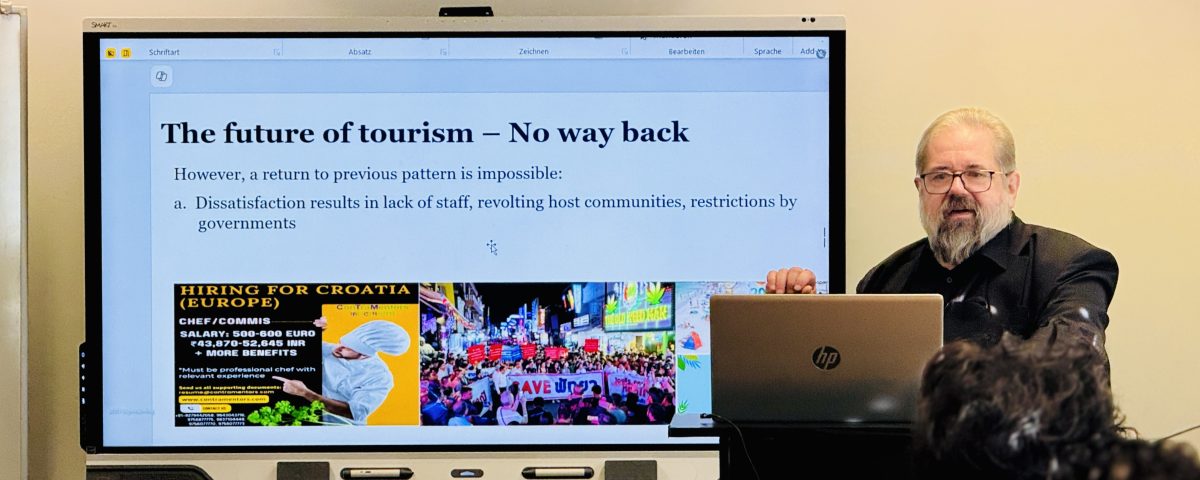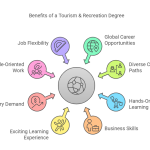
Tourism & Recreation: The Degree That Opens Doors to Endless Opportunities
May 5, 2025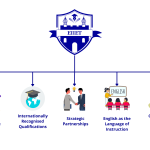
EIIET and International Mobility in Berlin: Your Gateway to Global Careers
May 18, 2025Shaping the Future of Tourism: A Visionary Lecture by Prof. Dr. Wolfgang Georg Arlt FRGS FRAS at EIIET
In an era defined by change, tourism is being reimagined. At the European Institute of Innovation, Entrepreneurship, and Technology (EIIET), Prof. Dr. Wolfgang Georg Arlt FRGS FRAS delivered a compelling lecture on the evolution, current challenges, and future direction of the global tourism industry. His insights from over five decades of observation and leadership call for a decisive shift towards a more sustainable and meaningful tourism model.
50 Years of Tourism Growth: From Takeoff to Turbulence (1970–2020)
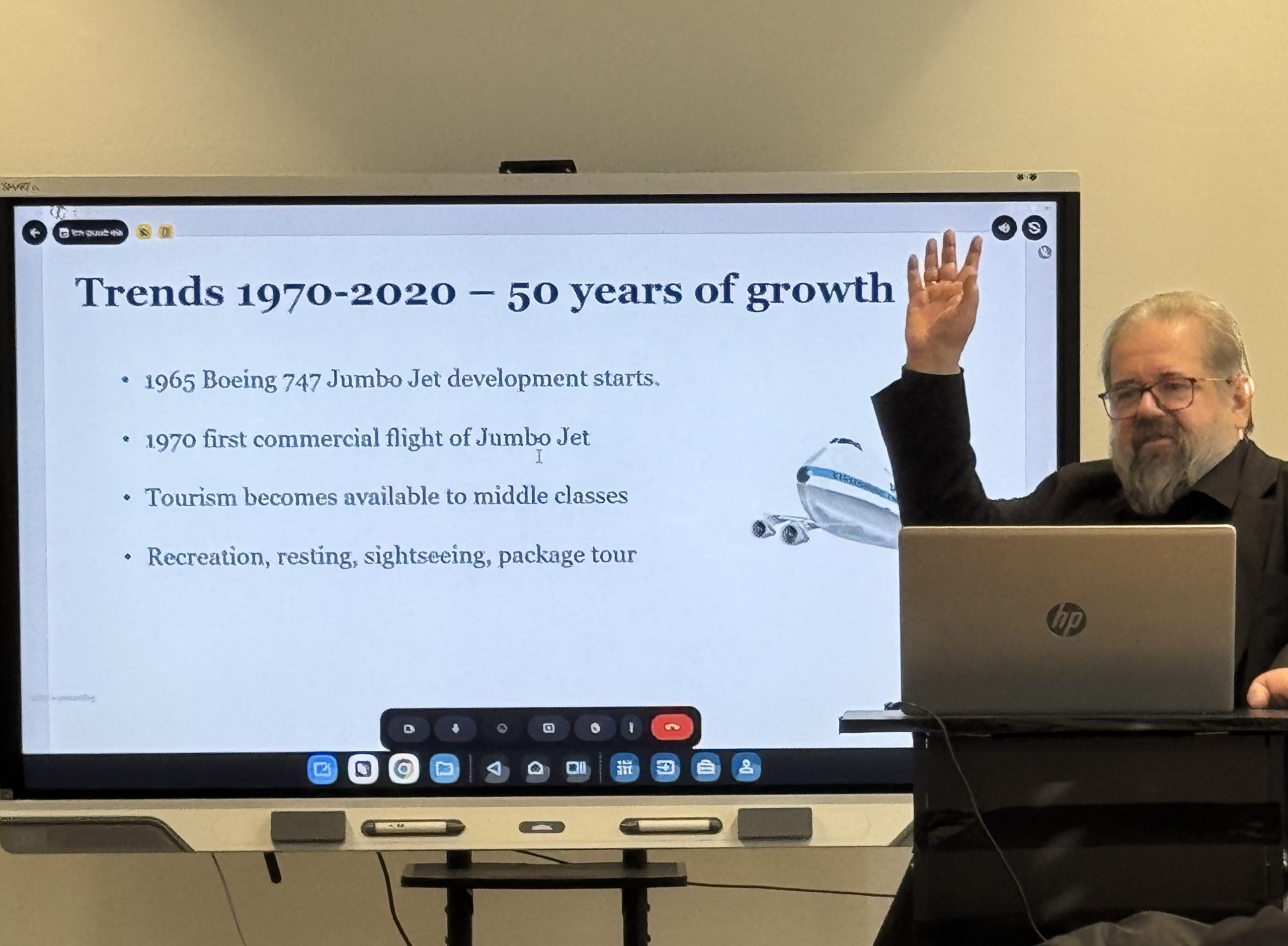
The story of modern tourism is one of explosive growth, evolving expectations, and increasing challenges. In his insightful presentation, Prof. Dr Wolfgang Georg Arlt FRGS FRAS mapped out five decades of tourism development—from the first jumbo jets to the rise of over-tourism.
The Jet Age: Opening the Skies
International travel was completely transformed in 1970 with the arrival of the Boeing 747. Suddenly, the middle class could afford what had previously been a luxury for the wealthy. As tourism emerged as a characteristic of contemporary life, leisure travel, package vacations, and sightseeing increased dramatically.
Tourism Transforms Cities
The impact of tourism resulted in significant changes to urban environments. For example, Barcelona's Las Ramblas began as a local promenade before growing into a popular tourist destination worldwide. More economic opportunities resulted from these improvements, but they also increased hostility between residents and tourists.
2019: The Turning Point
The industry reached a crucial point after 50 years of almost continuous expansion. As places struggled to control people and maintain quality of life, overtourism became a catchphrase. The Swedish phrase "Flygskam," which means "flight shame," became widely used, indicating a move toward more environmentally friendly and thoughtful travel.
Trends 2020–2024 – Debates over New Tourism Trends
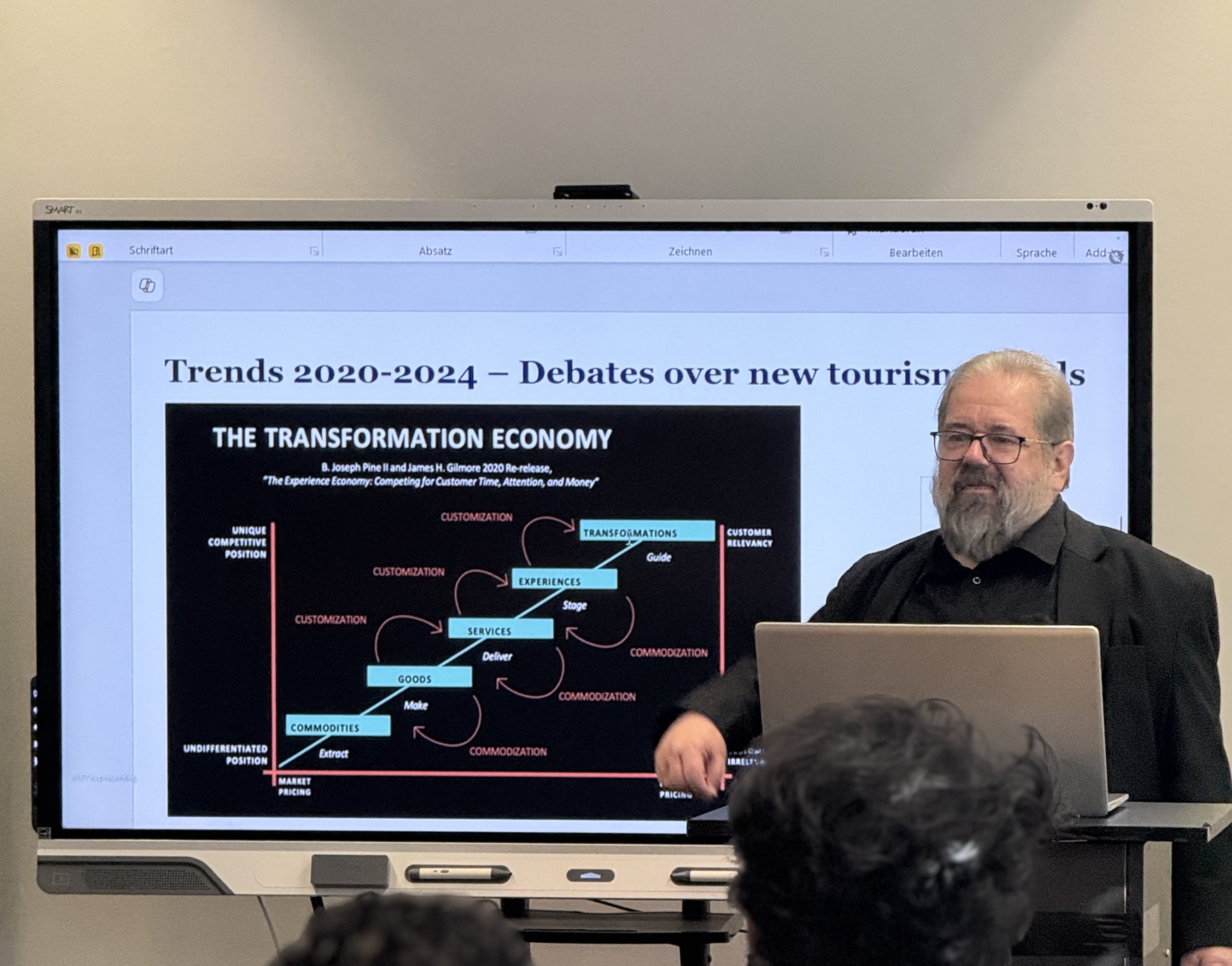
The COVID-19 pandemic didn’t just disrupt travel—it transformed it. In his presentation, Prof. Dr Wolfgang Georg Arlt FRGS FRAS explores how the global tourism industry shifted from chasing arrival numbers to prioritizing authenticity, experience, and personal transformation.
Redefining Success: Beyond Visitor Numbers
During the epidemic, the tourism industry was forced to pause and reflect. Among other antiquated metrics, hotel reservations and tourist numbers began to seem pointless. There was a new consensus: tourism must evolve. After 2020, the focus shifted from mass entertainment, shopping, and travel to meaningful and captivating experiences.
The Rise of Transformational Tourism
Travel is about transformation in this new environment, not just making memories. A true relationship, cultural interaction, and personal improvement are the things that tourists look for. Not only is it important where you go, but also how the experience molds you into the person you are. According to Prof. Arlt, who quotes Bina (2018), the modern traveler is defined by who they are becoming rather than by their age or income. It is essential to comprehend this "user evolution" in order to create meaningful tourism experiences.
Trends 2025 – Between Progress and the Pull of the Past
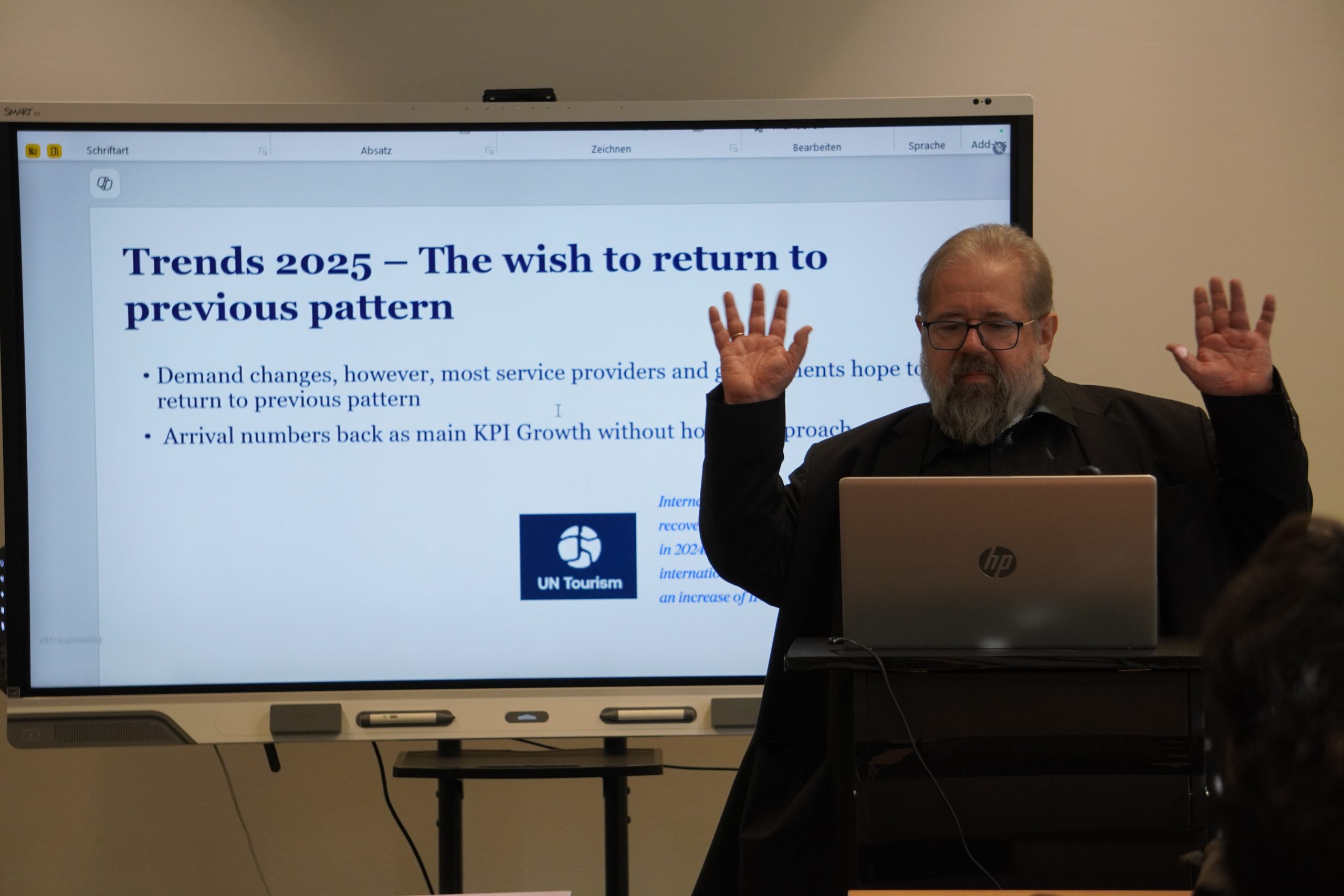
As the tourism industry adapts to post-pandemic conditions, 2025 shows an increasing conflict between two forces: the institutional pull toward traditional practices and the demand for significant change.
Back to Numbers: The Old Metrics Return
Despite the obvious lessons learned from the epidemic, many governments and service providers are going back to using well-known measures, such as growth rates and arrival numbers. There is a strong drive to return the tourism industry to its pre-2020 state, frequently ignoring the more in-depth, comprehensive strategies that have been considered in the past.
Ignoring the Shift in Demand
The demand for tourists has changed. Nowadays, tourists look for experiences that are transformative, sustainable, and value-driven. However, a large portion of the sector is relying on quantity-over-quality techniques rather than adapting to these changes, which puts supply and expectations at risk of becoming out of sync.
Partial Fixes Aren’t Enough
Initiatives like electric vehicles (EVs) are presented as solutions, but they represent only partial measures. Without rethinking the entire tourism model—its goals, impacts, and values—such solutions remain superficial.
The Future of Tourism – No Way Back
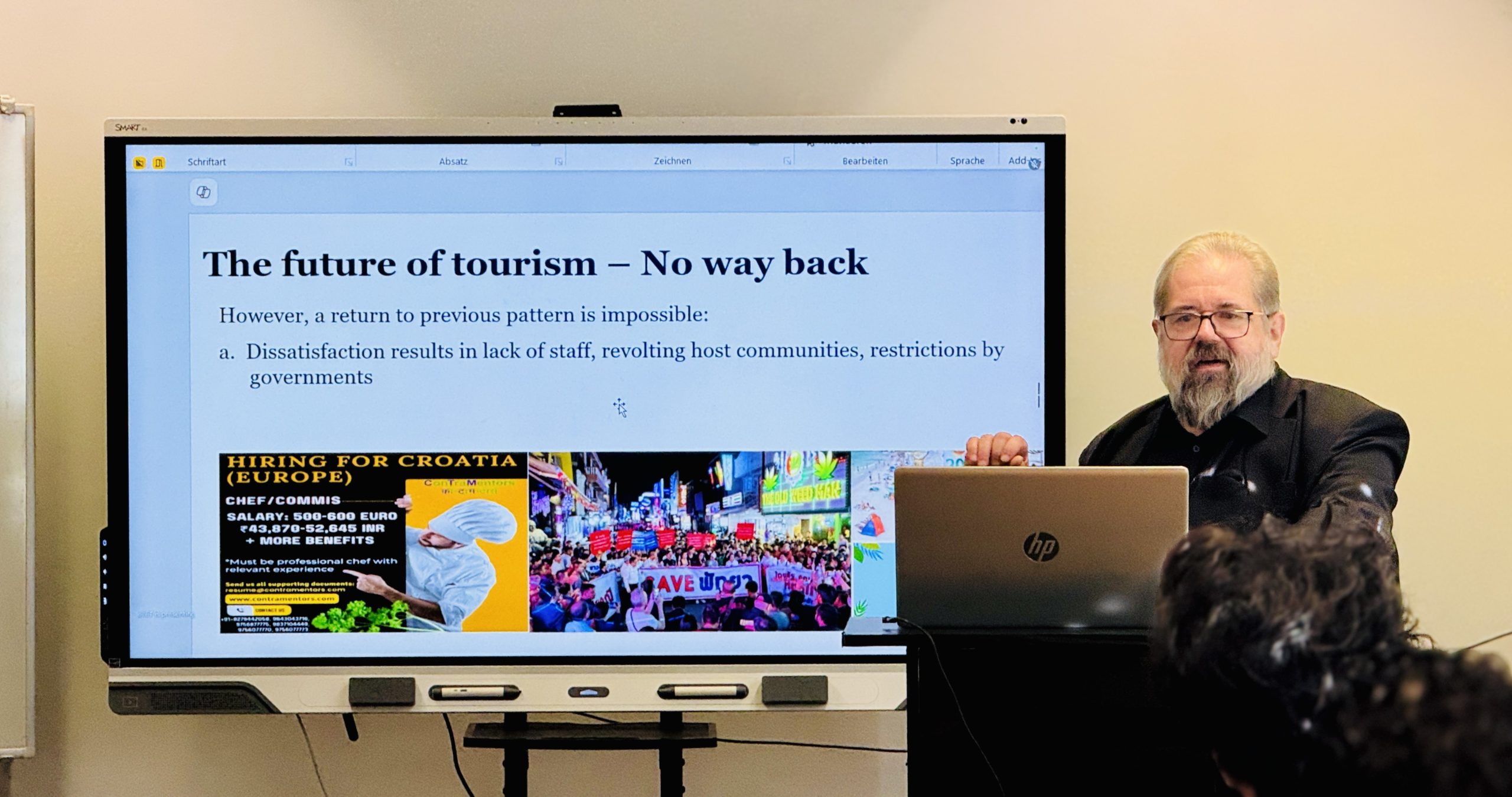
As the tourism industry looks ahead, one thing becomes clear: there is no return to the old ways. In this forward-looking presentation, Prof. Dr. Wolfgang Georg Arlt FRGS FRAS outlines why the tourism of the past is gone—and how the future must be fundamentally reimagined.
Why the Old Model is Broken
- Workforce dissatisfaction and a lack of staff
- Revolting host communities and local resistance
- Government restrictions and loss of trust
- A slowing global economy and political instability, with major countries governed by controversial or criminal leadership
- Artificial Intelligence (AI) redefining job markets—creating new high-skilled roles while eliminating many traditional, low-skilled ones
- Climate change as the most significant long-term disruptor
The End of Old Business Models
Tourism as we knew it—sunbathing on crowded beaches, ski holidays, shopping in city centers—is fading. Environmental, economic, and social pressures are pushing tourism indoors, off-season, and off the beaten path. This means more demand for:
- Transformative experiences
- New destinations
- Thematic travel centered on health, education, spirituality, and wellbeing
Tourism as a Solution, Not a Problem
Prof. Arlt urges the industry to redefine itself not as a burden on the planet, but as a driver of peace, cultural understanding, and sustainability. Future tourism must:
- Embrace the UN SDGs (Sustainable Development Goals)
- Align with IDGs (Inner Development Goals) and ESG (Environmental, Social, Governance) values
- Foster tolerance, diversity, and meaningful engagement
Meaningful Tourism
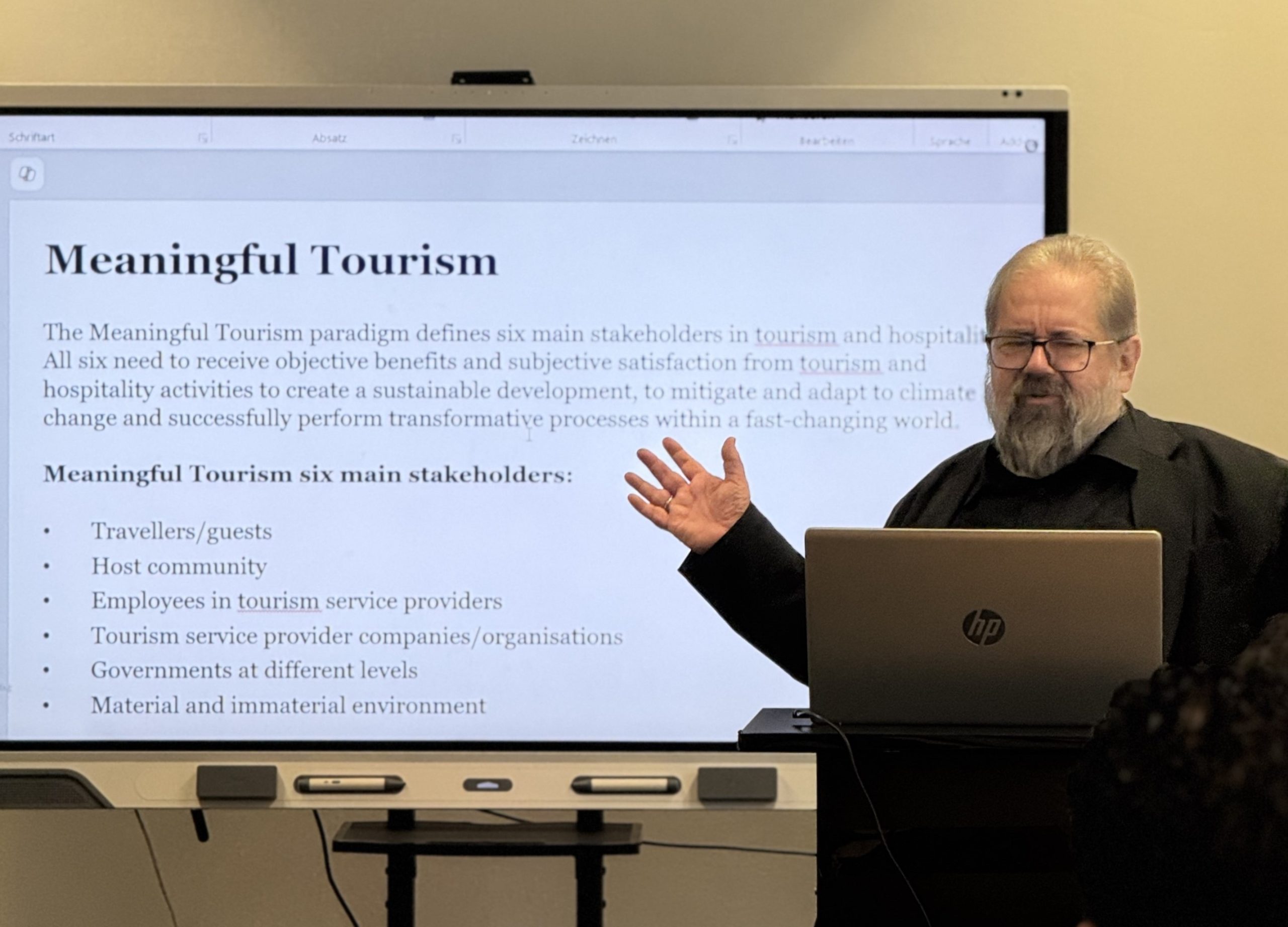
As the global tourism industry navigates climate disruption, post-pandemic recovery, and societal transformation, one thing is clear: tourism must evolve—not just in purpose, but in practice. That’s where Meaningful Tourism comes in.
What Is Meaningful Tourism?
Meaningful Tourism is a paradigm that ensures tourism brings both objective benefits and subjective satisfaction to all six main stakeholder groups:
- Travelers and guests
- Host communities
- Employees in tourism services
- Tourism and hospitality businesses
- Governments at all levels
- The material and immaterial environment
It’s not just about experience—it’s about shared value, sustainability, and holistic impact.
Why Now? The Urgent Need for Change
Tourism’s former model—mass arrivals, growth at all costs—is increasingly incompatible with today’s realities:
- Climate change is rendering traditional travel models obsolete (e.g., skiing, beach holidays)
- Overtourism and pollution backlash have shifted public perception
- Workforce shortages and declining tourism students post-COVID
- Superficial fixes like electric vehicles and tourism taxes don't address core issues
- Governments returning to outdated KPIs like arrival numbers
The Tools of Meaningful Tourism
The paradigm equips destinations, companies, and governments with:
- Stakeholder alignment strategies
- SMART KPIs to measure meaningful progress
- A comparative index across 88 countries using 72 indicators
- Integration into training, education, and public discourse
- Support for policy-making and sustainable investment strategies
A Global Movement in Motion
Launched with the Meaningful Tourism Centre (2021) and expanded through:
- Annual Meaningful Tourism Awards (Singapore, Doha, Kathmandu)
- Academic publications and global partnerships
- The Meaningful Tourism Index (2023)
- Workshops and education programs starting in 2024
More Than Just “Travel with Purpose”
Unlike “meaningful travel,” which centers solely on the tourist, Meaningful Tourism supports the entire ecosystem—including non-leisure travel like MICE, health, and education. It promotes a positive psychological and cultural framework rooted in wellbeing, equity, and future resilience.
Key Takeaways from the Lecture
- The tourism industry must shift from mass numbers to meaningful impact.
- Transformational travel is an emerging expectation among modern tourists.
- Climate change, AI, and societal shifts will define the industry's next chapter.
- Meaningful Tourism offers a structured framework to align stakeholders and redefine success.
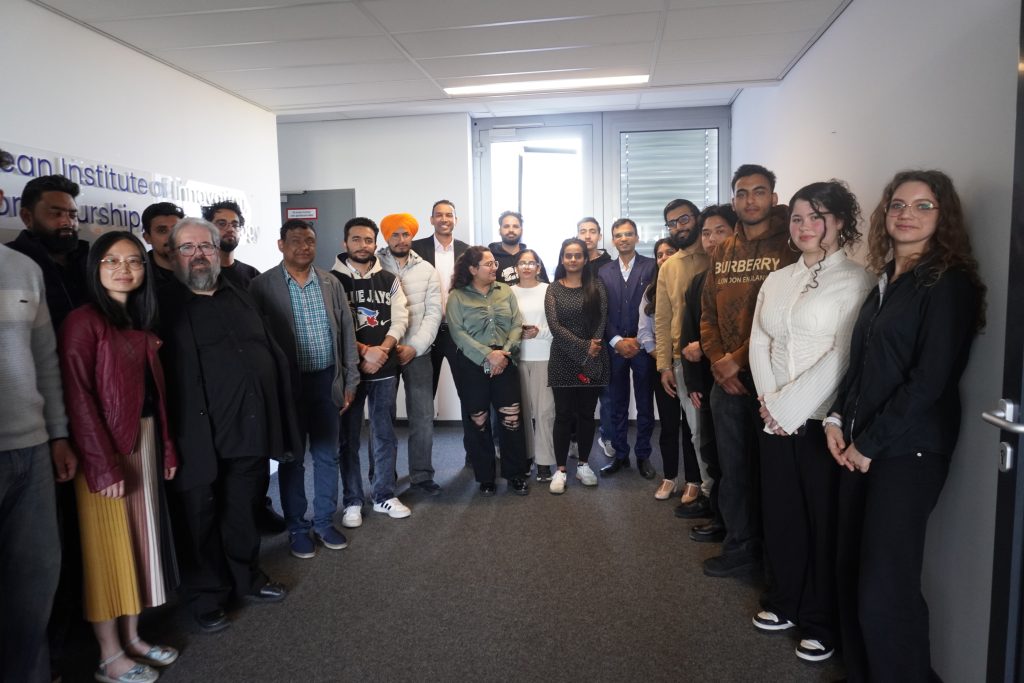
As tourism redefines itself amid global shifts, Prof. Arlt’s vision reminds us that the sector must evolve—not just grow. At EIIET, we commit to fostering this evolution through education and global dialogue.

